Writing Mechanics
英语作文五要素是什么内容
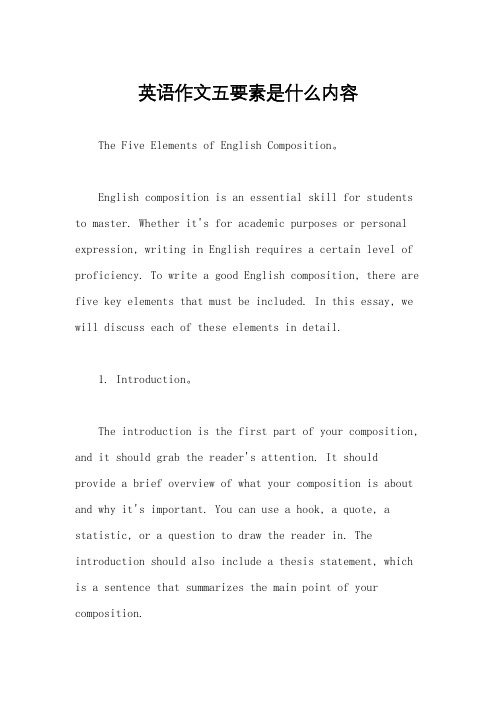
英语作文五要素是什么内容The Five Elements of English Composition。
English composition is an essential skill for students to master. Whether it's for academic purposes or personal expression, writing in English requires a certain level of proficiency. To write a good English composition, there are five key elements that must be included. In this essay, we will discuss each of these elements in detail.1. Introduction。
The introduction is the first part of your composition, and it should grab the reader's attention. It should provide a brief overview of what your composition is about and why it's important. You can use a hook, a quote, a statistic, or a question to draw the reader in. The introduction should also include a thesis statement, which is a sentence that summarizes the main point of your composition.2. Body。
英文写字知识点总结
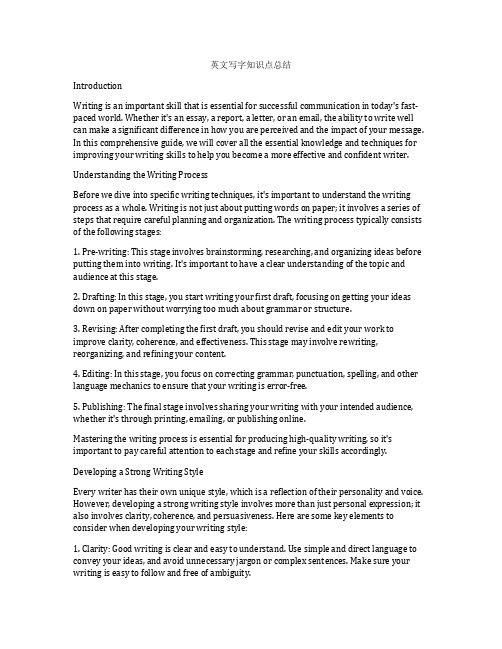
英文写字知识点总结IntroductionWriting is an important skill that is essential for successful communication in today's fast-paced world. Whether it's an essay, a report, a letter, or an email, the ability to write well can make a significant difference in how you are perceived and the impact of your message. In this comprehensive guide, we will cover all the essential knowledge and techniques for improving your writing skills to help you become a more effective and confident writer.Understanding the Writing ProcessBefore we dive into specific writing techniques, it's important to understand the writing process as a whole. Writing is not just about putting words on paper; it involves a series of steps that require careful planning and organization. The writing process typically consists of the following stages:1. Pre-writing: This stage involves brainstorming, researching, and organizing ideas before putting them into writing. It's important to have a clear understanding of the topic and audience at this stage.2. Drafting: In this stage, you start writing your first draft, focusing on getting your ideas down on paper without worrying too much about grammar or structure.3. Revising: After completing the first draft, you should revise and edit your work to improve clarity, coherence, and effectiveness. This stage may involve rewriting, reorganizing, and refining your content.4. Editing: In this stage, you focus on correcting grammar, punctuation, spelling, and other language mechanics to ensure that your writing is error-free.5. Publishing: The final stage involves sharing your writing with your intended audience, whether it's through printing, emailing, or publishing online.Mastering the writing process is essential for producing high-quality writing, so it's important to pay careful attention to each stage and refine your skills accordingly. Developing a Strong Writing StyleEvery writer has their own unique style, which is a reflection of their personality and voice. However, developing a strong writing style involves more than just personal expression; it also involves clarity, coherence, and persuasiveness. Here are some key elements to consider when developing your writing style:1. Clarity: Good writing is clear and easy to understand. Use simple and direct language to convey your ideas, and avoid unnecessary jargon or complex sentences. Make sure your writing is easy to follow and free of ambiguity.2. Coherence: Coherence refers to the logical flow and organization of your writing. Make sure your ideas are well-structured and connected, and use transitions and logical markers to guide your readers from one point to the next.3. Persuasiveness: Whether you're writing an argumentative essay or a persuasive business proposal, the ability to persuade your audience is crucial. Use evidence, logic, and rhetorical techniques to make your case and convince your readers.4. Tone: The tone of your writing sets the mood and attitude of your message. Whether it's formal, informal, serious, or lighthearted, your tone should be appropriate for your audience and purpose.5. Voice: Your writing voice is your unique personality and style as a writer. Develop a distinct voice that reflects who you are and what you stand for, but also be adaptable to different writing situations and genres.Improving Writing MechanicsIn addition to developing a strong writing style, it's important to pay attention to writing mechanics, including grammar, punctuation, spelling, and usage. Even the most compelling ideas can be undermined by poor writing mechanics, so it's crucial to master the following aspects:1. Grammar: Grammar refers to the rules and principles that govern the structure of sentences and phrases. Mastering grammar involves understanding parts of speech, sentence structure, subject-verb agreement, and other language rules.2. Punctuation: Punctuation marks such as commas, periods, semicolons, and quotation marks are essential for clarifying the meaning of sentences and organizing your writing. Use punctuation correctly to avoid confusion and improve readability.3. Spelling: Proper spelling is crucial for conveying your ideas accurately and professionally. Pay attention to commonly misspelled words and practice using a dictionary or spell-checker to catch spelling errors.4. Usage: Usage refers to the proper choice of words and phrases in your writing. Pay attention to common usage errors such as affect/effect, than/then, and its/it's, and use language resources to improve your usage.5. Style Guides: For more formal writing, it's important to follow a recognized style guide such as the APA, MLA, or Chicago Style. These guides provide specific rules for writing and formatting academic papers, reports, and other documents.By improving your writing mechanics, you can enhance the clarity and professionalism of your writing, making it more effective and impactful.Practicing Writing SkillsLike any other skill, writing requires practice and dedication to improve. Here are some effective strategies for practicing and honing your writing skills:1. Freewriting: Freewriting involves writing without stopping or censoring yourself for a set period of time. This exercise can help you generate ideas, overcome writer's block, and tap into your creativity.2. Journaling: Keeping a journal is a great way to practice writing on a regular basis, as it allows you to express your thoughts, feelings, and experiences in a personal and informal setting.3. Writing Prompts: Using writing prompts or exercises can help you focus on specific skills such as descriptive writing, narrative writing, or persuasive writing. You can find a variety of writing prompts online or create your own.4. Feedback: Seek feedback from peers, mentors, or writing groups to get constructive criticism and suggestions for improvement. Having an outside perspective can help you identify blind spots and areas for growth.5. Revision: Don't be afraid to revise and rewrite your work multiple times. The more you revise, the more you can refine your writing and make it stronger and more effective.By practicing these strategies regularly, you can develop your writing skills and become a more confident and proficient writer.ConclusionWriting is a skill that can be learned and improved with time and practice. By understanding the writing process, developing a strong writing style, mastering writing mechanics, and practicing regularly, you can become a more effective and confident writer. Whether you're a student, a professional, or a creative writer, the ability to communicate clearly and persuasively through writing is a valuable asset that can open doors and create opportunities in every aspect of your life. So, take the time to invest in your writing skills and watch as your words become more powerful and impactful.。
writing techniques
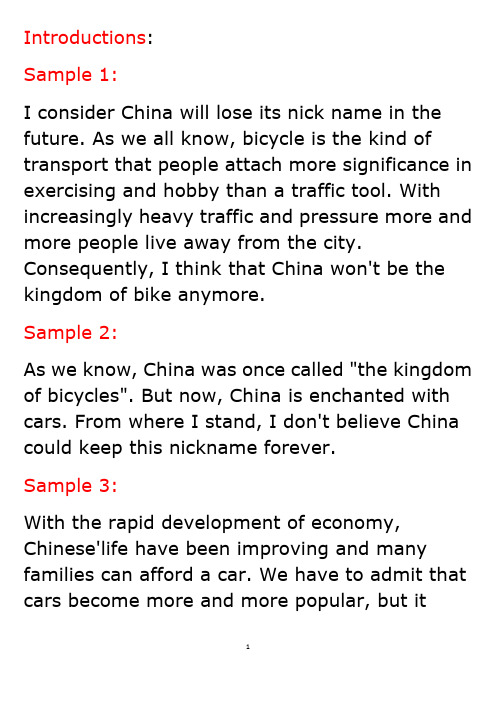
Introductions:Sample 1:I consider China will lose its nick name in the future. As we all know, bicycle is the kind of transport that people attach more significance in exercising and hobby than a traffic tool. With increasingly heavy traffic and pressure more and more people live away from the city. Consequently, I think that China won't be the kingdom of bike anymore.Sample 2:As we know, China was once called "the kingdom of bicycles". But now, China is enchanted with cars. From where I stand, I don't believe China could keep this nickname forever.Sample 3:With the rapid development of economy, Chinese'life have been improving and many families can afford a car. We have to admit that cars become more and more popular, but itdoesn't mean the nickname of China "Kingdom of bicycles"will become history in the future. Sample 4:With the development of science and technology, the living standard enhanced. Cars increase rapidly as well. As people say, China is enchanted with cars, even some people are worried about that the nickname--the kingdom of bicycle will become history in the future. However, I don't think so. I think that the nickname never becomes history and it will reach its peak one day.Conclusion:Sample 1:The change of this nickname is an inevitable consequence of the economic development. Sample 2:In short, according to China's current status, China's nickname "the kingdom of bicycles" will not become history in the future. The usage ofcars is increasing, but bicycles can't replace by cars.Sample 3:There is no denying the fact that it is impossible for anyone not to love cars more than bicycles. But I believe all the advantages of bicycles can be glimpsed and felt. Thus, Chinese nickname "the kingdom of bicycles" can never, ever be taken away.Sample 4:In conclusion, the bicycle will never be obsolete, which accounts for its various attractions including cutting down congestion and lowering pollution, etc. What is worth mentioning is the latest policy that the government decided to prohibit the scooter on the road, which will certainly recreate a better environment for bicycles. Do you think so?举例子(Example/Illustration):例子可以在文章开头(即所谓hook)举,从而引出论点;Unit 1 Text IIUnit 3 Text IUnit 4 Text I, Text II例子也可以在主体部分举。
作文4大维度

作文4大维度Writing is a complex task that involves multiple dimensions. It is not simply about putting words on paper, but rather about expressing thoughts, ideas, and emotions in a coherent and organized manner. The four main dimensions of writing are content, organization, style, and mechanics. Each dimension plays a crucial role in ensuring that the written piece is clear, engaging, and effective.作文是一项复杂的任务,涉及多个方面。
它不仅仅是在纸上写字,而是要以一种连贯和有条理的方式表达思想、观点和情感。
写作的四个主要维度是内容、组织、风格和语法。
每个维度在确保所写作品清晰、吸引人和有效性方面发挥着至关重要的作用。
First and foremost, content is the heart of writing. It encompasses the ideas, arguments, and information that the writer wishes to convey to the reader. Without strong and relevant content, the writing will lack substance and fail to engage the audience. A well-written piece is one that is rich in content, supported by evidence, and conveys a clear message or purpose to the reader.首先,内容是写作的核心。
新课标1卷英语历年作文

新课标1卷英语历年作文The New Curriculum Standard 1 Volume English exam has long been a crucial assessment for students in China seeking to demonstrate their proficiency in the English language. This exam, which covers a wide range of topics and skills, serves as a gateway for many students to pursue higher education and future career opportunities. As such, the ability to excel in this exam has become a highly sought-after goal for countless individuals.One of the key aspects of the New Curriculum Standard 1 Volume English exam is the composition section, where students are tasked with crafting a well-structured, thoughtful, and articulate piece of writing. This component not only tests the students' command of the English language but also their ability to organize their ideas, develop coherent arguments, and effectively communicate their perspectives.The composition section of the exam often presents students with a variety of prompts, ranging from personal experiences to societal issues, and challenges them to explore these topics in depth. Theability to critically analyze the given prompt, gather relevant information, and construct a compelling narrative or argument is essential for achieving a high score.To excel in the composition section, students must possess a strong foundation in English grammar, vocabulary, and writing mechanics. Additionally, they must develop the ability to think critically, draw upon their own experiences and knowledge, and present their ideas in a clear and concise manner. This requires consistent practice, a deep understanding of the exam's expectations, and a willingness to continuously refine and improve their writing skills.Many students have found success in the composition section by adopting a structured approach to their writing. This may involve outlining their ideas, organizing their thoughts into a cohesive flow, and ensuring that their writing is both engaging and well-supported. Additionally, the ability to effectively use rhetorical devices, such as persuasive language, metaphors, and anecdotes, can greatly enhance the overall quality and impact of the composition.Another crucial aspect of the composition section is the ability to effectively communicate one's ideas. This not only involves the mechanics of writing but also the ability to convey one's perspective in a way that is both compelling and accessible to the reader. Strong communication skills, including the ability to anticipate and addresscounterarguments, can be a significant advantage in the exam.Furthermore, the composition section of the New Curriculum Standard 1 Volume English exam often requires students to demonstrate their cultural awareness and understanding of global issues. This may involve discussing topics such as cross-cultural exchange, environmental sustainability, or the role of technology in shaping our world. By drawing upon their knowledge and experiences, students can craft compositions that showcase their intellectual depth and their ability to engage with complex, real-world topics.In recent years, the composition section of the New Curriculum Standard 1 Volume English exam has also placed a greater emphasis on the importance of creativity and originality. While strong writing mechanics and the ability to effectively communicate one's ideas remain crucial, the exam now also values the ability of students to think outside the box and present unique perspectives on the given prompts.This shift towards greater creativity and originality has challenged students to move beyond the traditional formulaic approach to essay writing and to instead embrace a more dynamic and engaging style of composition. By drawing upon their own experiences, their understanding of the world, and their ability to think critically,students can craft compositions that are not only well-written but also intellectually stimulating and thought-provoking.As the New Curriculum Standard 1 Volume English exam continues to evolve, it is clear that the composition section will remain a crucial component of the assessment. Students who are able to effectively navigate the complexities of this section and demonstrate their mastery of the English language, critical thinking skills, and creative expression will be well-positioned to succeed not only in the exam but also in their future academic and professional pursuits.In conclusion, the composition section of the New Curriculum Standard 1 Volume English exam is a challenging yet rewarding component that requires students to draw upon a wide range of skills and knowledge. By developing a strong foundation in English writing, honing their critical thinking abilities, and embracing the importance of creativity and originality, students can position themselves for success in this pivotal assessment and unlock a world of opportunities beyond.。
九年级英语核心素养目标教案

九年级英语核心素养目标教案Title: Ninth Grade English Core Literacy Target Teaching PlanIntroduction:In this teaching plan, we will outline the core literacy objectives for ninth-grade English students. The plan aims to enhance their reading, writing, listening, and speaking skills, as well as critical thinking and cultural understanding. This plan promotes a comprehensive approach to English learning, fostering students' ability to communicate effectively in both academic and real-life contexts.Section 1: Reading Skills Development1.1 Understanding Text StructuresTo develop students' reading comprehension, teachers will introduce various text structures such as descriptive, narrative, expository, and persuasive. Reading materials will be carefully selected to expose students to diverse writing styles and genres.1.2 Vocabulary EnrichmentTeachers will incorporate strategies such as context clues, word roots, and prefixes/suffixes to enhance students' vocabulary. Frequent exposure to authentic reading materials and regular vocabulary exercises will deepen their understanding of words and their usage.1.3 Reading Comprehension StrategiesStudents will learn and practice various reading comprehension strategies, including skimming, scanning, predicting, and inferring. Through guided exercises and discussions, they will develop the ability to grasp main ideas, recognize supporting details, and make logical inferences from the text.Section 2: Writing Skills Development2.1 Grammar and Sentence StructureTeachers will focus on teaching and reinforcing grammar rules, including parts of speech, verb tenses, subject-verb agreement, and sentence structure. Through interactive activities and error correction exercises, students will enhance their writing accuracy and fluency.2.2 Paragraph and Essay WritingStudents will learn the essentials of paragraph structure, including topic sentences, supporting details, and concluding sentences. They will also explore different types of essays, such as narrative, expository, and argumentative. Guided practice and peer feedback sessions will facilitate their writing development.2.3 Writing Mechanics and StyleTeachers will instruct students on proper punctuation usage, capitalization rules, and spelling. They will also emphasize the importance of clarity, coherence, and conciseness in writing. By analyzing model essays and engaging in editing exercises, students will refine their writing style.Section 3: Listening and Speaking Skills Development3.1 Active Listening SkillsActivities will be designed to enhance students' ability to comprehend oral instructions, lectures, and conversations. These activities will focus on note-taking, identifying key information, and understanding various accents and speech patterns.3.2 Speaking Skills and FluencyStudents will participate in discussions, debates, and presentations to develop their oral communication skills. Teachers will provide opportunities for them to express opinions, support arguments, and deliver clear and organized speeches. Pronunciation and intonation exercises will also be integrated.3.3 Cultural Understanding through Oral CommunicationTeachers will incorporate authentic listening materials to expose students to different cultures and perspectives. Through analyzing and discussing cultural topics, students will broaden their understanding of the world, develop tolerance, and respect for diversity.Section 4: Critical Thinking and Cultural Understanding4.1 Critical Analysis and EvaluationStudents will be exposed to various literary and informational texts, engaging in critical analysis and evaluation. They will develop the skills to identify bias, assess credibility, and analyze the author's purpose. Class discussions and written reflections will strengthen their critical thinking abilities.4.2 Cultural Literacy and Global AwarenessTeachers will provide opportunities for students to explore different cultures, literature, and historical events. Through reading culturally diverse texts and engaging with multimedia resources, students will develop a global mindset, respecting and appreciating different cultures.Conclusion:This ninth-grade English core literacy teaching plan aims to equip students with essential reading, writing, listening, and speaking skills. By integrating critical thinking and cultural understanding, students will develop a well-rounded set of English language abilities necessary for their academic and personal lives. Through consistent practice, guided instruction, and interactive activities, students will enhance their proficiency and overall language competence.。
英语写作基础教程第三版丁往道中文版
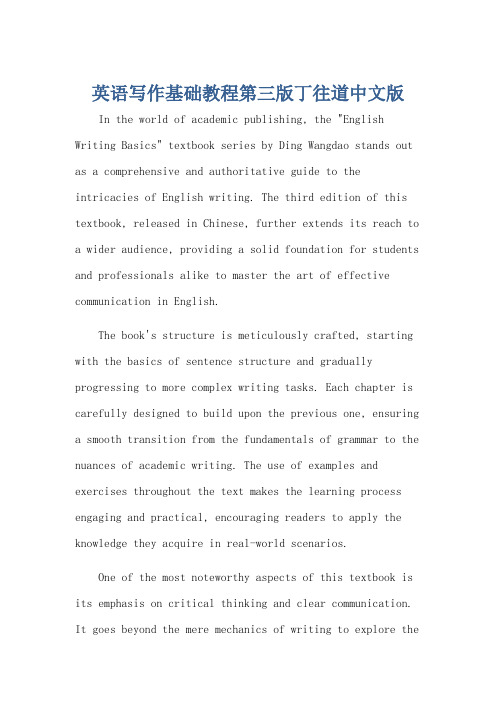
英语写作基础教程第三版丁往道中文版In the world of academic publishing, the "English Writing Basics" textbook series by Ding Wangdao stands out as a comprehensive and authoritative guide to the intricacies of English writing. The third edition of this textbook, released in Chinese, further extends its reach to a wider audience, providing a solid foundation for students and professionals alike to master the art of effective communication in English.The book's structure is meticulously crafted, starting with the basics of sentence structure and gradually progressing to more complex writing tasks. Each chapter is carefully designed to build upon the previous one, ensuring a smooth transition from the fundamentals of grammar to the nuances of academic writing. The use of examples and exercises throughout the text makes the learning process engaging and practical, encouraging readers to apply the knowledge they acquire in real-world scenarios.One of the most noteworthy aspects of this textbook is its emphasis on critical thinking and clear communication. It goes beyond the mere mechanics of writing to explore thedeeper reasons why certain writing techniques are effective. By encouraging students to analyze and evaluate their own writing, the book helps them develop a more nuanced understanding of how language can be used to persuade, inform, and inspire.The integration of Chinese language elements in thethird edition is a welcome addition. It not only caters to the needs of Chinese learners but also acknowledges the unique challenges and opportunities that arise when writing in a second language. The use of Chinese to explain complex concepts and writing techniques makes the material more accessible and relevant to the target audience.The book's coverage of different genres of writing, including essays, research papers, and even emails and resumes, demonstrates its comprehensiveness. It equips readers with the tools and strategies they need to tackle a wide range of writing tasks, whether they are students preparing for exams or professionals seeking to enhancetheir professional communication skills.The "English Writing Basics" third edition by Ding Wangdao is not just a textbook; it is a comprehensive guideto mastering the art of English writing. Its depth and breadth, combined with its practical approach and user-friendly format, make it an invaluable resource for anyone seeking to improve their writing skills in English.**英语写作基础教程第三版丁往道中文版:深入探索英语写作的精髓**在学术出版界,丁往道所著的“英语写作基础”教材系列以其全面性和权威性在英语写作指导中脱颖而出。
如何有业余爱好英语作文
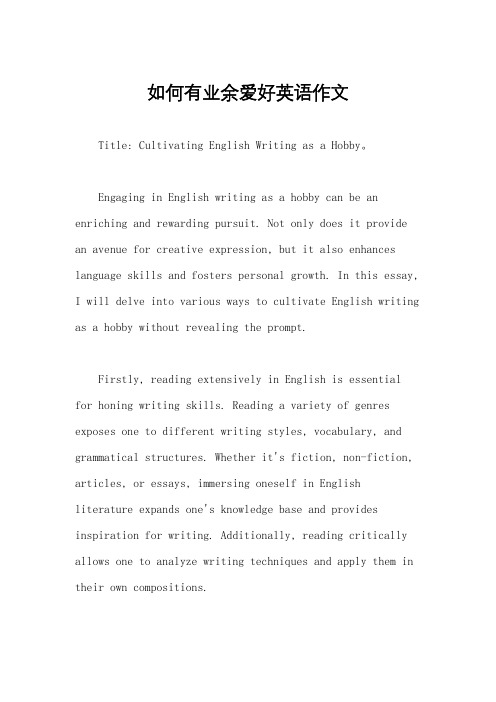
如何有业余爱好英语作文Title: Cultivating English Writing as a Hobby。
Engaging in English writing as a hobby can be an enriching and rewarding pursuit. Not only does it provide an avenue for creative expression, but it also enhances language skills and fosters personal growth. In this essay, I will delve into various ways to cultivate English writing as a hobby without revealing the prompt.Firstly, reading extensively in English is essentialfor honing writing skills. Reading a variety of genres exposes one to different writing styles, vocabulary, and grammatical structures. Whether it's fiction, non-fiction, articles, or essays, immersing oneself in Englishliterature expands one's knowledge base and provides inspiration for writing. Additionally, reading critically allows one to analyze writing techniques and apply them in their own compositions.Secondly, practice is paramount in improving English writing proficiency. Setting aside dedicated time each day to write helps develop fluency and creativity. Writing prompts, journaling, or participating in online writing communities can provide motivation and feedback. Experimenting with different forms of writing such as narratives, descriptive essays, or opinion pieces allowsfor exploration and growth as a writer. Moreover, revising and editing one's work is crucial for refining ideas and polishing language usage.Furthermore, seeking opportunities for constructive feedback is invaluable in the journey of improving English writing skills. Joining writing groups or workshops enables interaction with fellow writers who can offer insights and suggestions for improvement. Constructive criticism helps identify strengths and weaknesses in one's writing, facilitating continuous learning and development. Additionally, receiving feedback from experienced writers or mentors provides guidance and encouragement to strivefor excellence in English writing.Moreover, embracing technology can enhance the English writing experience. Utilizing writing software or applications can aid in organizing ideas, improving productivity, and refining writing mechanics. Features such as grammar checkers, spell checkers, and word processors streamline the writing process and ensure clarity and correctness in written communication. Additionally, leveraging online resources such as writing forums, blogs, or podcasts provides access to a wealth of information and support for aspiring writers.In conclusion, cultivating English writing as a hobbyis a fulfilling endeavor that offers numerous benefits. Through reading, practice, seeking feedback, and utilizing technology, individuals can enhance their writing skills and unleash their creativity. Continuous learning and dedication are essential in mastering English writing and enjoying the journey of self-expression. So, whether it's crafting stories, sharing insights, or expressing thoughts, embracing English writing as a hobby opens doors to endless possibilities and personal growth.。
- 1、下载文档前请自行甄别文档内容的完整性,平台不提供额外的编辑、内容补充、找答案等附加服务。
- 2、"仅部分预览"的文档,不可在线预览部分如存在完整性等问题,可反馈申请退款(可完整预览的文档不适用该条件!)。
- 3、如文档侵犯您的权益,请联系客服反馈,我们会尽快为您处理(人工客服工作时间:9:00-18:30)。
Capitalization
•
•
Capitalize the first word of a sentence;
Capitalize proper nouns and their abbreviations;
•
•
Capitalize the title a work of art;
Capitalize the first word of spoken dialogue
– ex-president(前总统); self-confidence
• IV. To divide spelled-out numbers
– To use a hyphen between the numerator anddenominator (e.g. three five-hundredths 3/50O) – To use hyphens to express combinednumbers and words (e.g. a 5-to-2 football match)
– lt should be placed in the middle of the first line. – Title +subtitle; A Word/Noun phrase/Sentence.
• Arrangement of the blank line between the title and the first paragraph. • Arrangement of Paragraphs.
Writing Mechanics
商英17101班 夏丹虹 段广丽 喻吉宇
Writing Mechanics
Arrangment
Spelling
Capitalization
Abbreviations
Hyphenation
Ltalics
Arrangement
• Arrangement of Margin. • Arrangement of the title (Place and Expressive Forms).
– The first line of every para should be indented (To start writing after a space of four letters ).
Spelling
• Good Spelling is the result of study and memory.Writing continually and using a dictionary • continually are two excellent ways to become a good speller.
– To divide words between syllables
(Syllabication 音节划分方法Never divide single-syllable words)
– to-ge-ther;strug-ge;swm-ming;success-ful.
• To divide a word with its prefix
Abbreviations
• To avoid using the ampersand (&) as a symboI for the conjunction AND. • To avoid using Latin abbreviations
– etc: and so on; and so forth; and the rest – e.g. : for example – vs. : versus – i.e:that is (to say) – cf: compare – et al. : and others
Italics
• To italicize foreign words (words don't belong to English vocabulary) • To use italics to stress words or expressions. • ★当今,教师一词可以表达不同的意思。 • The word teacher presents different meaning nowadays. • To Italicize the names of vehicles (names of ships, trains, air or space vehicles)
•Leabharlann I. To join two or more words together
long-term; kilowatt-hours; light-years fighting-for-freedom-not-money soldiers
• •
Il. To divide a word at the end of a line
– To proofread(校对) the spelling of words during the stage rewriting.
Hyphenation
• The hyphen is the mark (-) used to join two or more words together, or to show a word divided between the end of one line and the beginning of another. It is also used to dividea word with its prefix, or to express spelled-out numbers.
– AlI words should be capitalized of the title (including words following hyphens in compound words) except 1.articles. 2.prepositions less than five letters.3.coordinating conjunctions such as and, or, but, nor,and for, 4.and to in infinitives when they don't appear at the beginning of the title.
